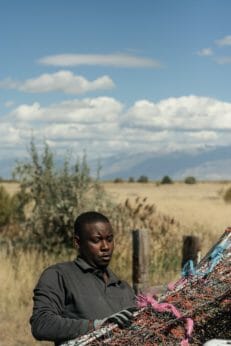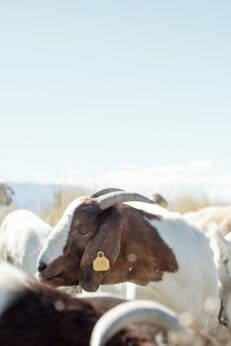A Piece of Home on the Range
For new Americans displaced by conflict and ethnic strife, the ability to raise goats lifts them up, providing sorely needed cultural continuity and a taste of the old country.
Then, in 1994, the Rwandan genocide encroached upon Tanzania. Just 14 years old, Deogratiasi watched as bloated, mutilated corpses floated down the Kagera River, the primary source of drinking water for his village. Forced to relocate again, the family headed deeper into Tanzania, landing at the Lukole refugee camp, where all six members remained – despite overcrowding and frequent outbreaks of typhoid and malaria – until 2006. That year, U.S. Citizen and Immigration Services approved Deogratiasi’s application for refugee status, and he left his mother, father, and three brothers behind for an unknown future in Salt Lake City.
“The mountains take me back,” says the Goat Project’s Gustave Deogratiasi. “I bring my children here, and they see me doing what I did growing up. This is how we keep our culture.”
Now 37 and a married father of four, Deogratiasi says, “I don’t like to talk about my past. It was a very hard life. But out of hard things comes something good. I’m an American.”
He’s also the herdsman, and sole full-time employee, at the East African Refugee Goat Project of Utah, established five years ago by the International Rescue Committee in conjunction with the Utah Refugee Services Office and generous members of the community: a rancher who procured 45 animals; a mining company that leased the project 40 acres of desert grassland for $1 per year; and numerous Burundian and Somalian refugees, who volunteer their time, building fences, weaning kids, and cleaning hoofs. In return, they’re able to purchase whole goats, which are slaughtered halal style – the by-hand method prescribed by Islamic law.

“It’s a way for them to maintain cultural continuity and keep their heritage alive,” explains Joshua Lloyd, a program manager for the International Rescue Committee. “I had one participant tell me that these goats are a gift from God. He was emotional, and I felt taken aback by how deeply he’d been affected.”
Deogratiasi understands. Following a series of menial jobs, including three gigs as a hospital custodian, he’s found fulfillment on the Utah ranch, tucked between the Oquirrh and Wasatch ranges. “The mountains take me back,” he says. “I bring my children here, and they see me doing what I did growing up. This is how we keep our culture.”
Under his watch, the herd has thrived. It’s expected to reach 500 heads this spring and turn a profit next year, with proceeds funding scholarships for refugee youth. Recently, the project started renting the herd to area businesses for brush control and plans to expand goat meat sales to Utah’s entire refugee population (approximately 60,000) and general consumers. The most valuable gains, of course, have not been financial.
This strong connection to goats might surprise some American-born citizens, who tend to view the barnyard darling through pet-colored glasses. But for two-thirds of the planet’s population, goats represent a dietary staple and a peaceful, pastoral means of earning an income. And as the number of forcibly displaced persons around the world increases – nearly doubling over the past two decades, per the United Nations High Commissioner for Refugees – more and more of them are carrying an affinity for a goat to their new homes, including the United States.
Ironically, the benefits that fuel goat meat’s global popularity – nutritional value and sustainability – may soon make it fashionable here. Goat is lower in fat than chicken and almost as protein-packed as beef, which requires nearly 50 percent more water to produce, on a
pound-for-pound basis. The fact that goats prefer eating bark and leaves also renders them ill-suited to factory farming: 90 percent of the goats raised in this country are on farms of 100 acres or less.
“The days of eating a 42-ounce ribeye with the family every Friday night are over,” declares Patrick Martins, founder of Heritage Foods USA. Each October, or “Goatober” in Heritage Foods parlance, the online butcher encourages restaurants across the country to serve goat for the entire month. Some pretty impressive ones sign up: New York City’s Babbo and Charleston’s Hominy Grill participated last fall.

According to the latest USDA data, the number of goats slaughtered domestically has risen steadily since the turn of the millennium. And the market-research firm IndexBox predicts that per-capita goat consumption in America will jump 25 percent by 2025.
Already, the East African Refugee Goat Project of Utah has been showered with that sincerest form of flattery. Shortly after the project’s 2013 launch, Pine Island Community Farm, a refugee-focused nonprofit in Burlington, Vermont, incorporated goat farming. The herd is overseen by Chuda Dhaurali, a native of Bhutan, whose family had to abandon their 140-acre farm in 1986 when the government stripped them of citizenship for being members of a minority ethnic group. Dhaurali, then 9, spent the next 18 years at a refugee camp in Nepal before the United Nations helped him his wife, and daughter, move to Burlington.
Dhaurali used to drive to Boston – a seven-hour round-trip – for fresh goat meat. Today, he raises his own and sells the live animals to customers, who can butcher them, halal style, in an on-site slaughter room. “I never thought I’d be able to do this in America,” he says. “I connect with many communities who speak many different languages. I can see what I do is very important to them. It makes me feel proud.”
Soon, he and Deogratiasi should have new compatriots, as several additional refugee-relief organizations have announced plans to acquire goats, among them the Refugee Welcome Corporation in Albany, New York, and Common Earth Gardens in Louisville, Kentucky. Even one for-profit business, the New Americans Workers Cooperative, says it’ll be hiring displaced Somalis to oversee its herd in Syracuse, New York, this summer.
“I’m happy to see other cities and states doing the same thing,” says Deogratiasi, who believes goat farming has the power to bridge both continents and generations. “My children love it in America. They can go to school. They can grow up and do so many things,” he explains. “But when I bring them to the ranch, they see a past life, something they can’t understand from videos on YouTube. They can see the difference between that life and now.”
Follow us
This work is licensed under a Creative Commons Attribution-NoDerivatives 4.0 International License.
Want to republish a Modern Farmer story?
We are happy for Modern Farmer stories to be shared, and encourage you to republish our articles for your audience. When doing so, we ask that you follow these guidelines:
Please credit us and our writers
For the author byline, please use “Author Name, Modern Farmer.” At the top of our stories, if on the web, please include this text and link: “This story was originally published by Modern Farmer.”
Please make sure to include a link back to either our home page or the article URL.
At the bottom of the story, please include the following text:
“Modern Farmer is a nonprofit initiative dedicated to raising awareness and catalyzing action at the intersection of food, agriculture, and society. Read more at <link>Modern Farmer</link>.”
Use our widget
We’d like to be able to track our stories, so we ask that if you republish our content, you do so using our widget (located on the left hand side of the article). The HTML code has a built-in tracker that tells us the data and domain where the story was published, as well as view counts.
Check the image requirements
It’s your responsibility to confirm you're licensed to republish images in our articles. Some images, such as those from commercial providers, don't allow their images to be republished without permission or payment. Copyright terms are generally listed in the image caption and attribution. You are welcome to omit our images or substitute with your own. Charts and interactive graphics follow the same rules.
Don’t change too much. Or, ask us first.
Articles must be republished in their entirety. It’s okay to change references to time (“today” to “yesterday”) or location (“Iowa City, IA” to “here”). But please keep everything else the same.
If you feel strongly that a more material edit needs to be made, get in touch with us at [email protected]. We’re happy to discuss it with the original author, but we must have prior approval for changes before publication.
Special cases
Extracts. You may run the first few lines or paragraphs of the article and then say: “Read the full article at Modern Farmer” with a link back to the original article.
Quotes. You may quote authors provided you include a link back to the article URL.
Translations. These require writer approval. To inquire about translation of a Modern Farmer article, contact us at [email protected]
Signed consent / copyright release forms. These are not required, provided you are following these guidelines.
Print. Articles can be republished in print under these same rules, with the exception that you do not need to include the links.
Tag us
When sharing the story on social media, please tag us using the following: - Twitter (@ModFarm) - Facebook (@ModernFarmerMedia) - Instagram (@modfarm)
Use our content respectfully
Modern Farmer is a nonprofit and as such we share our content for free and in good faith in order to reach new audiences. Respectfully,
No selling ads against our stories. It’s okay to put our stories on pages with ads.
Don’t republish our material wholesale, or automatically; you need to select stories to be republished individually.
You have no rights to sell, license, syndicate, or otherwise represent yourself as the authorized owner of our material to any third parties. This means that you cannot actively publish or submit our work for syndication to third party platforms or apps like Apple News or Google News. We understand that publishers cannot fully control when certain third parties automatically summarize or crawl content from publishers’ own sites.
Keep in touch
We want to hear from you if you love Modern Farmer content, have a collaboration idea, or anything else to share. As a nonprofit outlet, we work in service of our community and are always open to comments, feedback, and ideas. Contact us at [email protected].by Diane Stopyra, Modern Farmer
August 29, 2018
Modern Farmer Weekly
Solutions Hub
Innovations, ideas and inspiration. Actionable solutions for a resilient food system.
ExploreExplore other topics
Share With Us
We want to hear from Modern Farmer readers who have thoughtful commentary, actionable solutions, or helpful ideas to share.
SubmitNecessary cookies are absolutely essential for the website to function properly. This category only includes cookies that ensures basic functionalities and security features of the website. These cookies do not store any personal information.
Any cookies that may not be particularly necessary for the website to function and are used specifically to collect user personal data via analytics, ads, other embedded contents are termed as non-necessary cookies.
